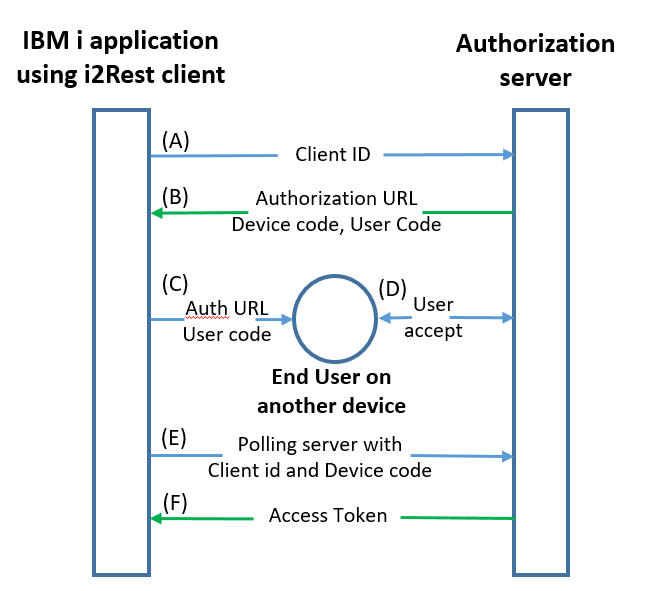Device flow description
Overview
Oauth 2.0 Device flow is the authorization scenario for those devices (like IBM i), that has no ability to display an authorization web page when making request to private data on resources with limited access. When application runing on a such device trying to access some protected data,

Device flow scheme.
(A) i2Rest Client initiates the flow with a request to the authorization server. The request incudes client identifier and requested scope.
(B) The authorization server responds with a device code, an end-user code and the verification URL.
(C) i2Rest Client displays an end-user code and the verification URL and thus instructs the end user to visit authorization page using a user agent on another device.
(D) The end-user follows provided verification URL on any browser capable device.
(E) i2Rest Client starts polling authorization server with device code to determine whether the user has authorized the request.
(F) The authorization server authenticates the client, performs validation of the device code, and, if access was granted by end user, responds with an access token.
Device flow by i2Rest command
The next parameters are mandatory to perform request with Device flow by I2Rest command.
| Parameter | Description |
|---|---|
| Authentication method | *OAUTH2D must be specified |
| Command | Any of available request type can be choosen |
| API endpoint | HTTP resource to serve the request |
| User/OAuth2 client/device ID | Credentials to authenticate i2Rest Client with authorization server |
| User/OAuth2 client/dev passwd | |
| OAuth2 authorization endpoint | HTTP resource to be requested for an authorization URL and device code |
| OAuth2 token endpoint | HTTP resource to be requested for an access token |
| Scope | The set of resources and operations that are allowed to application with access token |
| Keyword | Parameter | Description |
|---|---|---|
| AUTHMETHOD | Authentication method | *BRIDGE must be specified |
| COMAND | Request type | Any of available request type can be choosen |
| URL | API endpoint | HTTP resource to serve the request |
| AUTHID | User/OAuth2 client/device ID | Credentials to authenticate I2Rest Client with authorization server |
| AUTHPW | User/OAuth2 client/dev passwd | |
| AUTHURL | OAuth2 authorization endpoint | HTTP resource to be requested for an authorization code |
| TOKENURL | Token endpoint | HTTP resource to be requested for an access token |
| SCOPE | Scope | The set of resources and operations that are allowed to application with access token |
| BRIDGEURL | i2Rest access flow bridge url | Redirection URI to be passed to authorization server |
| BRIDGEID | i2Rest bridge client ID | Credentials to authenticate I2Rest Client with i2rest Server |
| BRIDGEPW | i2Rest bridge client password |
i2Rest command example bellow represents request for creating i2rest.doc file on Google Drive, please explore the appropriate use case.
I2REST COMMAND(*POST)
URL('https://www.googleapis.com/drive/v3/files')
BODY(*N '{"name":"i2rest.doc"}'
'application/json' *YES 1208)
OUTPUT(*BOTH)
AUTHMETHOD(*OAUTH2D)
DCMCLIENT(MYCLIENT)
TOKENS('/tokens/tokens.usrspc')
AUTHID('<client ID>')
AUTHPW('<client secret>')
AUTHURL('https://oauth2.googleapis.com/device/code')
TOKENURL('https://oauth2.googleapis.com/token')
SCOPE('https://www.googleapis.com/auth/drive.file')